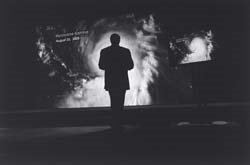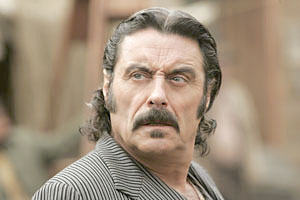
An Inconvenient Truth
Starring: Al Gore
Written by: Al Gore
Directed by: Davis Guggenheim
Official Website
Photo courtesy of Film Threat
I needed to assuage my liberal guilt.
The best way to do this of course is not by, you know, actually doing anything, but watching other people doing something and agreeing with them heartily. That's what I do. I don't do things. I watch other people do things, and then write about what I watched them doing. This is usually about as active as I can get.
With this philosophy in mind I went to see An Inconvenient Truth last weekend. Both hailed by critics and booed by the right-wingers, I was pretty sure I would enjoy it. Plus I admired its brilliant marketing campaign, which touted the film as a disaster movie a la The Day After Tomorrow or Armageddon, and was called "the most terrifying movie you will ever see."
But while there were some truly unsettling and even frightening moments in An Inconvenient Truth, I didn't exactly run from the theatre screaming. I think there were probably too many graphs involved for that. What An Inconvenient Truth is, is a highly informative and captivating lesson in environmental science, courtesy of Al Gore. Basically a taped session of his "slide show," as Gore endearingly calls it, the movie puts forward the evidence surrounding global warming, discounts the theory's critics and provides a practical, unhysterical view of what will happen to our planet if we continue to slowly poison it.
Gore is at his most genial (dare I say charismatic?) using Matt Groening cartoons and badly done CGI polar bears to illustrate some of his points. But he is also deadly serious, weaving this story of the not-so-distant future with a sense of urgency that hasn't been expressed before. He showed what New York City would look like if the polar ice caps melted and the ocean's level rose (the World Trade Center Memorial site would be completely submerged, a truly disturbing symbol Gore doesn't shy away from.) He flipped through one photo after another of mountain ranges and glaciers slowly melting from the late 1970s until they are practically nothing. "By 2050," he says bluntly, "there will be no more snows of Kilimanjaro."
I wouldn't call Inconvenient Truth a documentary, necessarily- in many ways it reminds me distantly of the movies I was shown in high school science class. People have argued that it's skewed, but that's entirely missing the point. Gore's argument is that his slide show- and likewise this film- can't be skewed because all scientific evidence (not some or most but all) points to global warming as a human-induced process that is rapidly changing our climate and world. Graph after graph of the distinct rise in temperature, emissions, and climate events like hurricanes can't lie. Gore isn't skewing the truth, because for him (as well as the vast majority of scientists) the truth can't be skewed.
Go see An Inconvenient Truth. The critics are right that it is an important film and actually a lot more entertaining and captivating than a lot of people would believe. But most importantly, see it because in the end it's not a movie that terrifies. At least not by the end. Because Gore, at the end, has hope for the future. His main point is that this is a fixable problem, that every single person can help to slow. By making global warming our fault, he is also showing that what we began we can cease. We can all do something, not just watch others doing it and agree with them. We have power over our world.






